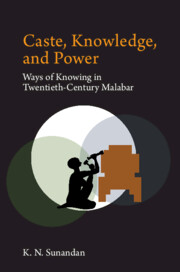Book contents
- Frontmatter
- Contents
- Acknowledgements
- Notes on Transliteration
- Introduction: Caste, Knowledge, and Power
- 1 An Ashari World of Knowing
- 2 An Ashari World of Ignoring
- 3 A Nampoothiri World of Acharam
- 4 Nampoothiris and the Order of Knowledge
- 5 Asharis and the Order of Knowledge
- Postscript: Towards an Artisanal Way of Practice of Knowing
- Bibliography
- Index
Postscript: Towards an Artisanal Way of Practice of Knowing
Published online by Cambridge University Press: 11 October 2022
- Frontmatter
- Contents
- Acknowledgements
- Notes on Transliteration
- Introduction: Caste, Knowledge, and Power
- 1 An Ashari World of Knowing
- 2 An Ashari World of Ignoring
- 3 A Nampoothiri World of Acharam
- 4 Nampoothiris and the Order of Knowledge
- 5 Asharis and the Order of Knowledge
- Postscript: Towards an Artisanal Way of Practice of Knowing
- Bibliography
- Index
Summary
This is a postscript and not a conclusion; it is a reflection on the contemporary politics of knowledge production in the background of the stories already told in the previous chapters. Further, this postscript is an impressionistic attempt to give the reader a feel of the fleeting images of knowing and doing, which are difficult to translate into a two-dimensional plane of the paper or the screen you read. The postscript starts in a familiar mode of academic discussion and slowly moves into a speculative mode: an expression of my hopes and dreams in the domain of knowledge production. I consider stepping towards an equitable society as the objective of educational practices and democracy as the basic condition for achieving this objective. These are the axioms from which I speculate some strategies for dismantling the colonial–brahmanical forms of knowledge production and to imagine certain democratic ways of knowing.
The challenges for creating a democratic system of practices of knowing are numerous. The first challenge is that of power–knowledge entanglement and its present manifestation in India as a hierarchical series of colonial–brahmanical knowledge. We have seen that power is not just an external enabling factor of knowledge production but also very much an intrinsic element of knowledge. Similarly, knowledge is not just something that can be used to gain power but also itself a form of power. The value and status assigned to knowledge has been empowering it, and this can be challenged only by bringing balancing forces in all the domains of application of power–knowledge. I explore the possibility of ethics, as privileged by Asharis in asharippani, working as a balancing force in the process of democratizing knowledge production. The Ashari ways of knowing as doing, as I tried to impress in the previous chapters, were certainly entangled with caste practices of Asharis, and hence, any kind of revival of traditional forms associated with these practices is problematic for a democratic system. However, as I argued in the Introduction, the power–knowledge entanglement has become ‘problematic’ only in a specific historical condition where knowledge became the measure of the status of a human in an unequal society.
- Type
- Chapter
- Information
- Caste, Knowledge, and PowerWays of Knowing in Twentieth Century Malabar, pp. 189 - 205Publisher: Cambridge University PressPrint publication year: 2023



